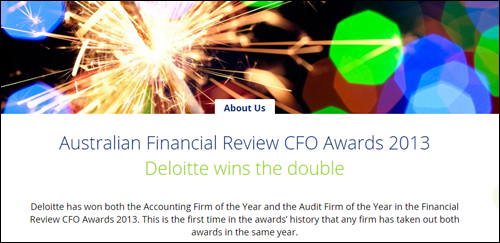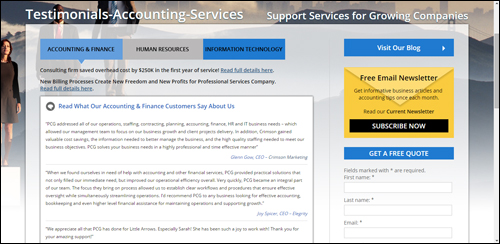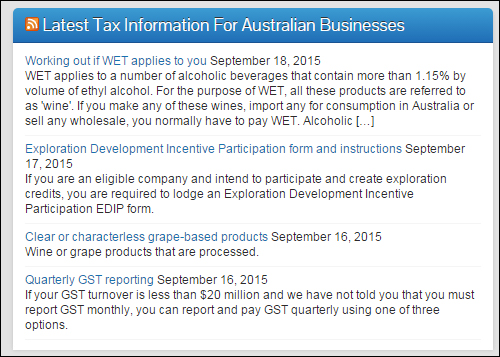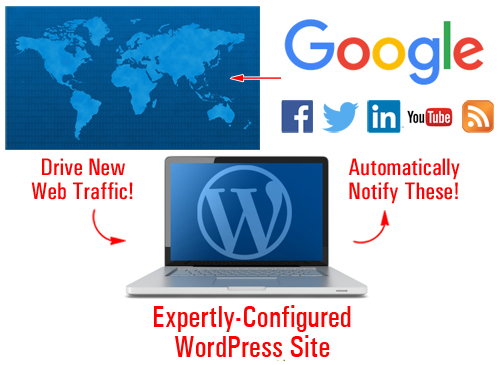Grow Your Accounting Business Online With WordPress
 Accounting professionals face many challenges in today’s online economy, especially in terms of growing a presence online.
Accounting professionals face many challenges in today’s online economy, especially in terms of growing a presence online.
Online Challenges For Accountants
Now, more than ever, accountants must work hard and find smarter ways to stand out from the crowd, source new business, and retain current clients. Not only do you have to actively participate in the communities and industries you serve, you must also develop a strong digital presence. This includes having a dynamic website and learning how to better promote your business services online.
In addition to spending dollars advertising offline, you will probably find (if you haven’t already) that in order to compete with other web-marketing savvy accounting businesses, increasingly larger amounts of their budget need to be directed to develop and manage a website that can bring new prospective clients, engage users, outrank the competition in search engines and help you create a wider amount of marketing reach online.
This means that your site not only has to look great, your pages have to be fast-loading, and your website layout has to be easy to navigate, but it’s also important to keep in mind that the needs of the website will change in time and sections may need to be frequently updated. This requires the implementation of a well-planned web and content management strategy.
Another challenge that CPAs (and most professions) face, is that they have an average of 30 seconds to provide users what they are looking for or they will go away.
“Websites have evolved into central information hubs where service information is still present but enhanced with web portals, hyperlinks to state and federal sites, and a variety of free tools.”
Michael Alter, http://www.accountingweb.com/technology/accounting-software/tips-for-improving-your-website
Opportunities For Professional Accountants
As well as facing a number of challenges, there are also many online opportunities available to businesses in the accounting profession that can adapt to meet online economy demands and who can think progressively about improving their online business marketing skills.
In this detailed guide, you will learn about opportunities to attract more visitors and establish stronger online credibility for your business.
![]()
As well as providing useful website improvement tips, we also focus on the benefits and advantages of using the WordPress platform to power your accounting or financial services website or blog.
For more information about the benefits and advantages of using the WordPress Content Management System (CMS), see the articles below:
- Discover How A Poorly Constructed Website Can Lose You Money
- Using WordPress To Grow Your Business Online
Useful Tips To Improve Your Website
In this section we will show you how to improve your website and get better results. We will look at what pages your site needs, what type of content works best for accounting websites, tips for improving your layout and navigation structure, etc.
If you need website planning assistance, visit this page: A Cost-Saving Guide To Web Site Planning For Non-Technical Business Owners
Essential Website Pages
All websites require a number of basic web pages. Let’s go over these.
Description Of Services
It’s essential to include a page that lists your services and any products that you offer.
It will include services such as:
- Business accounting – planning, incorporation of companies, general accounting, payroll, preparing financial statements, book keeping, budgeting, financing, forecasting, strategic planning, consulting, etc.
- Taxation – preparation, planning, reviewing, auditing, advising, problem resolution
- Investment strategies
- Corporate accounting
- Wealth creation
- Superannuation/retirement plan (401k) advice
- Audit risk assessment and assurance
- Quickbooks – setup, training, tune up, and support
- Specialist services – mergers, acquisitions, information technology, secretarial, rentals, trusts, fiduciary accounting, succession planning, selling a business, transfers, etc.
- Lending and leasing
List all of the services you provide, not just the ones you specialize in. Educate your visitors about what these services do and why they should choose you.
About Us Page
This page should give a description of your business and explain to visitors what it stands for, its unique approach, causes supported, etc.
It’s important to also list any business awards, recognitions, accreditations, certifications, publications, associations, etc., that can be used to promote your company and set it above other competitors.

(List all of your awards certifications, accreditations, recognitions, publications, associations, etc. in the About page. Screenshot source: deloitte.com)
Core Team
If you are looking for cost-effective ideas to grow your business online or get people to stay longer on your site, then make it easier for your prospects to get to know, like and trust you and your organization better.
Prospects need to relate to your business. One great way to do that is to have a page that introduces your staff or team members. It should include a photo and a mini bio. Since most visitors won’t be familiar with accounting terms it should tell who they are and what their specialties are. It should also explain what those specialties mean. This page should even include social buttons that will allow your site visitors to follow your staff members on their social networks.
In this page, make sure to outline your staff member’s experience, why they are an invaluable asset to your team, and more importantly, how they will help add value to your clients’ business.

(Make sure to add a page that introduces your staff to prospective new clients. Image source: deepsky.com)
If you need help how to add an updatable simple team members directory in your site using a free WP plugin, refer to this tutorial: How To Easily Create A Simple Staff List For Your WordPress Site Without Editing Code
Work For Us
This is a listing of career opportunities within your organization. It would include training, employee benefits, opportunities for advancement, etc. You should also include case studies of graduates who have risen within your company and information such as the job outlook and new career opportunities in the accounting and financial services industry.
Also include a positions available section in your page. If there are no positions currently available, consider inviting people to return periodically to this page, join your newsletter, follow you on social media, etc.
Testimonials
Case studies and reviews from clients are a great way to show prospective clients what type of solutions you are capable of implementing to help them solve problems. Adding a web page with testimonials from past clients and case studies also establishes social proof.

(Add a page with case studies and testimonials. Screenshot image sourced from: pcg-services.com)
We have written extensively about using client case studies and reviews to improve your business results online. If you are interested in learning more here: Improve Your Conversions Using Meaningful Testimonials
Contact Page
A clean contact page is absolutely necessary.
Your contact page should provide the following information:
- Business Name
- Location
- Phone number
- Facsimile number
- Map
- Website URL
- Contact form
- Request for more information – contact details
- Links to social media networks
- Online Chat/Skype (optional)
If your business operates from multiple areas you want to make that clear when showing the address and contact information.
Consider also including links to an FAQ page, useful pages, special offers, support page, newsletter, blog, etc.
Add An Accounting Or Financial Services Blog Section
A blog is a very powerful business marketing tool. Blogs typically comprise of a content management system that is easy to use and allows you to promote your business using timely content such as industry announcements, product updates, educational articles, informative posts, videos, infographics, etc.
If you already have an established website, then consider adding a WordPress blog to promote your organization.
If you don’t have a website yet, or your existing site is hard to keep updated with new content or not delivering you the results you want, then WordPress can serve as both your business website and business blog.
![]()
Very few people know that an expertly configured WordPress site can become an automated traffic-generation machine that can help attract targeted visitors to your site, simply by adding regular content to your website.
(WordPress can drive web traffic automatically to your website)
Go here to learn more about this: WordPress Web Traffic Blueprint – How To Get More Web Traffic For Your Business
Legal Information
Having a website that complies will all legal requirements online is essential, not just for building trust with prospective clients, but also to ensure that no local, regional and federal laws or regulations are being broken wherever your do business in.
Depending on what services you provide, adding the following legal pages to your accounting or financial services site will help you stay out of legal hot water with most regulatory authorities, third-party service providers, and other potential sources of threats and legal inconveniences:
- Contact Page
- Privacy Statement
- Terms Of Use
- Website Disclaimer
- Affiliate Agreement
- Anti-Spam Policy
- Compensation Disclosure
- DMCA Notice
- Earnings Disclaimer
- External Links Policy
- Financial Disclaimers
- Refund Policy
- Video/Audio Terms
- etc.
We have written a comprehensive article on adding legal pages to your website here: How To Add Legal Pages To Your Website
How To Improve The Content On Your Site
In today’s globally competitive economy, the earlier you begin to publish great content on your site, the faster you will begin to see results and differentiate yourself from the competition.
By committing to providing great content with useful information and tips, you will get your readers to share your content and come back for more information. Publishing content is the most effective way to educate site visitors and prospective clients about your business and about using your services and products.
For example, topics for an accounting or financial services business can include the following:
- Explanations of balance sheets
- Overlooked tax deductions
- Directors’ duties and legal responsibilities
- How to present accounts for fundraising activities
- Cashflow planning tips
- Business insurance
- Risk protection
- Structuring a self-managed retirement fund
- Dos and don’ts of … (e.g. purchasing vs leasing, claiming business expenses, etc.)
You can also create a series of educational articles that will help your your readers understand your accounting services, such as finance accounting, small business accounting, business budgeting, reducing debt, understanding financial concepts, etc.
Remember to include the same keywords and terminology in your articles that prospective clients will be searching for online.
![]()
We recommend subscribing to our Content Marketing Email Training Series. You will receive regular training emails with easy-to-digest information and practical tips that will teach you how to drive more traffic to your website, save money creating useful content for your visitors and grow your business online using content. It’s not only a great course with loads of useful information, it’s also 100% FREE!
Ways Of Improving User Experience
Improving your site’s user experience (known as UX) helps you keep visitors coming back and using your site. This section will show you ways you can improve visitor engagement and UX.
Syndicate Content With RSS Feeds
An RSS feed provides lots of benefits for your website.
If you provide valuable information, other sites may want to syndicate your content.
Some of the benefits of having other businesses syndicate your content, include:
- All of your content updates are kept in one place
- Content distribution doesn’t rely on email
- Feeds can be shared and picked up by other sites online
- RSS feeds allow users to subscribe
- It provides links to your content
- Feeds can be submitted to RSS directories
- RSS provides various ways for your readers to receive your content (e.g. subscribers can read the content on their mobile device using different applications)
- RSS is built into WordPress
There are also benefits when it comes to providing information on your site from other websites, such as the fact that you don’t have to write, manage or update the content.
To find RSS feeds with loads of useful content for your website, search online for relevant government departments or industry bodies.
Here are examples of feeds you could consider adding to your accounting site:
- Taxation Policy Center: http://www.taxpolicycenter.org/press/rss.cfm
- Australian Taxation Office: https://www.ato.gov.au/RSS-news-feeds.aspx
- Canada Revenue Agency: http://www.cra-arc.gc.ca/rssfeeds/
- UK HM Revenue and Customs: http://www.hmrc.gov.uk/rss/rss.htm
- South Africa Revenue Service: http://www.sars.gov.za/Pages/RSS-Feeds.aspx

(Use RSS feeds to provide your visitors with a better UX.)
Adding Forms
Checklists and forms are a great way to help increase user engagement and add value to your audience. Checklists and forms can provide users with step-by-step instructions and resources to get necessary tasks performed. Checklists and forms are great planning tools.
Checklists and forms could cover subjects such as:
- How To Set Up A Company
- Negative Gearing Worksheet
- Non-Profit Governance Checklist
- Disclosure Checklists
- Individual Tax Checklist
- Self Managed Super Fund Tax Checklist
- Income Tax Variation Forms
Unique Tools
Providing useful online tools and applications for businesses (or links to these tools) is a great way to increase visitor engagement and significantly add value to your users. Calculators, such as loan and tax calculators, are great tools to add to accounting websites. Others would include time cards, and retirement and interest calculators.
In part 2 of this guide, we take a look at a number of online tools you can use in your site using WordPress plugins and themes that can help improve search engine optimization, increase user engagement and drive more traffic to your business.

***
This is the end of part 1 of this article on ways to grow your accounting business online.
Click here to view Part Two:
![]()
Get Notified When New Tutorials Are Published – Subscribe To WPCompendium.org!
***
***
"I was absolutely amazed at the scope and breadth of these tutorials! The most in-depth training I have ever received on any subject!" - Myke O'Neill, DailyGreenPost.com
***
